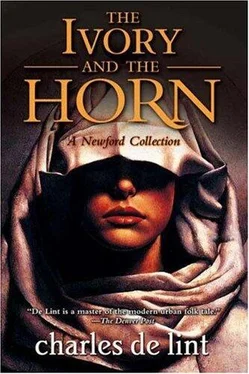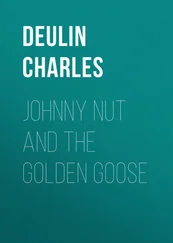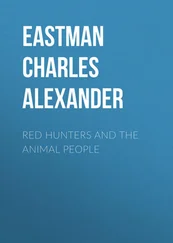I inherited Tommy the same way I did rest of my family: I found him on the streets, abandoned. I worried some at first about keeping him with me, but when I started asking around about institutions, I realized he'd have something with me and the dogs that he couldn't get anywhere else: a family. All a guy like Tommy needs is someone willing to put the time into loving him. You don't get that in places like the Zeb, which is where he lived until they discharged him so that someone with more pressing problems, read money, could have his bed.
One of the things I hate about the way my life's going now is that I hardly ever see him anymore. Our landlady knows him better than I do these days and that's depressing.
The day after I talk to Shirley in the subway, I get off early from work. There's a million things I should be doing— like the week's grocery shopping and research for a history essay at the library— but I decide the hell with it. It's a beautiful day, so I'm going to pack up a picnic lunch and take the family to the park.
I find Tommy and Aunt Hilary in the backyard. She's working on her garden, which for a postage-sized tenement lot is a work of art, a miniature farm and English garden all rolled into about a twenty by twenty foot yard of sunflowers, rosebushes, corn, peas, every kind of squash, tomatoes and flowerbeds aflame with playing color and scent. Tom's with the paper people that I cut out of magazines and then stick onto cardboard backings for him. The dogs are sprawled all over the place, except for Rexy, who's dogging Aunt Hilary's heels. You don't understand how apt an expression like that is until you see Rexy do his I-always-have-to-be-two-inches-away-from-you thing.
Tommy looks up when he hears the dogs starting to yap, and suddenly I'm inundated with my family, everybody trying to get a piece of hello from me at the same time. But the best thing is seeing that kind of sad expression that Tommy's wearing too much these days broaden into the sweetest, happiest smile you can imagine. I don't figure I've ever done anything to deserve all this unadulterated love, but I accept it— on credit, I guess. It makes me try harder to be good to them, to be worthy of that love.
I've got the trick down pat by now, ruffling the fur of six dogs and giving Tommy a hug without ever letting anybody feel left out. Aunt Hilary's straightening up from her garden, hands at the small of her back as she stretches the kinks from her muscles. She's smiling, too.
"We had a visitor," she tells me when the pandemonium settles down into simple chaos.
Tommy's leading me over to the big wooden tray on a patch of grass to show me what his paper people have been up to while. I was gone this morning, and the dogs sort of mooch along beside us in an undulating wave.
"Anybody I know?" I ask Aunt Hilary.
"I suppose you must," my landlady says, "but she didn't leave a name. She just said she wanted to drop by to see how your family was making out— especially your son."
I blink with surprise at that. "You mean Tommy?"
"Who else?"
Well, I guess he is like my kid, I think.
"What did she look like?" I ask, half-anticipating the answer.
"A bit like a homeless person, if you want to know the truth," Aunt Hilary says. "She must have been wearing three or four dresses under her overcoat."
"Was she black?"
"Yes, how did you—"
"Hair in dreadlocks with lots of buttons attached to them?"
Aunt Hilary nods, "And she kept fiddling with something in her pockets that made a rattle-y sort of sound."
"That's Shirley," I say.
"So you do know her."
"She's an old friend."
Aunt Hilary starts to say something else, but I lose the thread of her conversation because all I'm thinking is, I'm not crazy. Other people can see her. I was being pretty cool whenever Shirley showed up, but I have to admit to worrying that her presence was just the first stage of a nervous breakdown.
Suddenly I realize that I'm missing everything my landlady's telling me about Shirley's visit.
"I'm sorry," I tell her. "What did you say?"
Aunt Hilary smiles. She's used to my spacing out from time to time.
"Your friend didn't stay long," she says. "She just told Tommy what a handsome young man he was and patted each of the dogs with utter concentration, as though she wanted to remember them, and then she left. I asked her to stay for some lunch, or at least a cup of tea, because she looked so— well, hungry, I suppose. But she just shook her head and said, 'That's very kind of you but I don't indulge anymore.' "
Aunt Hilary frowns, "At least I think that's what she said. It doesn't really make a lot of sense, when you consider it."
"That's just Shirley," I tell her.
I can tell Aunt Hilary wants to talk some more about it, but I turn the conversation to my plan for an outing to the park, inviting her along. She hasn't got the time, she says— is probably looking forward to a few hours by herself, is what I hear, and I don't blame her— but she gets right into helping me get a knapsack of goodies organized.
We have a great day. Nothing's changed. I've still got to deal with my malaise, I've still got the ghost of a dead friend hanging around, but for a few hours I manage to put it all aside and it's like old times again.
I haven't seen Tommy this happy since I can't remember when, and that makes me feel both glad and depressed.
There's got to be a better way to live.
7
I decide it's time to get some expert advice, so the next day I call in sick at work and head off down to Fitzhenry Park instead.
Everybody who spends most of their time on the streets isn't necessarily a bum. Newford's got more than its share, of genuinely homeless people— the ones who don't have any choice: winos, losers, the hopeless and the helpless, runaways, and far too many ordinary people who've lost their jobs, their homes, their future through no fault of their own. But it's also got a whole subculture, if you will, of street musicians, performance artists, sidewalk vendors and the like.
Some are like me: They started out as runaways and then evolved into something like when I was making cash from trash. Others have a room in a boarding house or some old hotel and work the streets because that's where their inclination lies. There's not a whole lot of ways to make a living playing fiddle tunes or telling fortunes in other outlets, and the overhead is very affordable.
Fitzhenry Park is where a lot of that kind of action lies. It's close to the Combat Zone, so you get a fair amount of hookers and even less-reputable types drifting down when they're, let's say, off-shift. But it's also close to the Barrio, so the seedy element is balanced out with mothers walking in pairs and pushing strollers, old women gossiping in tight clusters, old men playing dominoes and checkers on the benches. Plus you get the lunch crowds from the downtown core which faces the west side of the park.
The other hot spot is down by the Pier, on the lakefront, but that's geared more to the tourists, and the cops are tight-assed about permits and the like If you're going to get arrested for busking or hawking goods from a sidewalk cart or just plain panhandling, that's the place it'll happen.
The kind of person I was looking for now would work the park crowds and I found him without hardly even trying. He was just setting up for the day.
Bones is a Native American— a full-blooded Kickaha with dark coppery skin, broad features and a braid hanging down his back that's almost as long as Angel's hair. He got his name from the way he tells fortunes. He'll toss a handful of tiny bones onto a piece of deerskin and read auguries from the pattern they make. He doesn't really dress for the part, eschewing buckskins and beads for scuffed old work-boots, faded blue jeans and a white T-shirt with the arms torn off, but it doesn't seem to hurt business.
Читать дальше












